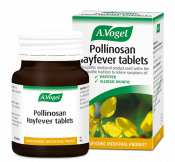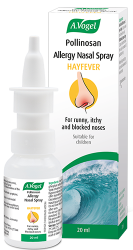Allergic rhinitis and headaches
As there are a few things that might cause an allergic rhinitis sufferer to experience a headache, to help narrow down the source of your pain, it’s best to go through each cause individually.
Sinus headaches
The sinuses are made up of four hollow, air-filled spaces and are positioned behind the forehead, cheekbones and the bridge of the nose. They are connected to the nose by narrow passages which allow mucus and fluid to drain away.
When the immune system comes into contact with an allergen it releases histamine in an attempt to rid itself of these particles. This can result in a whole range of symptoms including inflammation of the passages that lead to and from the sinuses.
This means fluid and mucus can’t be drained away and so not only does this lead to an increase in fluid but it can also become thicker as well. Unfortunately, this can, in turn, lead to headaches and pain in areas where the sinuses are.
Migraines
Allergic rhinitis may also give rise to painful migraines though the reasons for this are less clear. There have been suggestions that the release of histamine can also trigger these severe headaches.
Runny nose
Surprisingly, a runny nose, a key symptom of allergic rhinitis, may also contribute to headaches. This causes us to sniff almost automatically and this constant action can create a sore head.
How to tell if allergic rhinitis is causing your headache
Headaches can be caused by a variety of things so if you’re worried, it’s best to visit your doctor for their opinion. However, here are a few signs that allergic rhinitis may be at the root of the problem.
Frequency – regular headaches may indicate that allergic rhinitis is the problem.
Other symptoms – allergic rhinitis has a variety of symptoms such as watery eyes and sneezing so this, alongside headaches, suggests allergic rhinitis is the issue.
When it occurs – pollen is the biggest cause of allergic rhinitis so if your symptoms get worse between spring and summer when plants are beginning to pollinate, allergic rhinitis may be the issue.
What can you do?
As well as being uncomfortable, headaches can prevent you from going about your day-to-day life as they make it more difficult to concentrate. However, fortunately there are a few things you can do to ease the severity of the problem.
Apply a warm, damp cloth to the sinuses – this should ease any many or discomfort in the area.
Avoid histamine – food and drink that contain excessive levels of histamine may exasperate your symptoms so these are best avoided during a flare up of allergic rhinitis. This includes caffeine, alcohol, milk-based products and smoked meat.
Stay hydrated – drinking lots of water eases congestion by helping to thin mucus so that it can drain more easily from the nose. It also promotes good blood flow which should minimise the risk of you developing a headache.
Try steam – steam is often used to treat congestion so this should, in turn, help your headache. Warm baths, showers and hot drinks can therefore prove helpful in combatting this problem.
Use a neti pot – to help your congestion you may wish to flush your nose with a neti pot which can be obtained from a pharmacy.
How to avoid contact with allergens
In order to improve your allergic rhinitis symptoms, it is regularly suggested that one should avoid their trigger. However, this is a challenging task so to help you out, here are a few tips on how to avoid allergens.
Animal dander – when you have pets keep pet-free areas within your home.
Dust mites – these gather in bedding, rugs and carpets so wash these areas regularly.
Mould spores – prevent a build-up of mould by using extractor fans, cleaning regularly and opening windows.
Pollen – avoid going out when pollen counts are high and to be sure of when this is, look at a local pollen count.
Herbal remedies
Sinus headaches are often the result of congestion so addressing this should help ease the problem.
Pollinosan Hayfever Tablets address a range of hayfever symptoms including congestion and are non-drowsy so unlike a lot of allergic rhinitis treatments, it won’t interfere with your day-to-day life.
The Sinuforce Nasal Spray may also be useful for congestion as it reduces inflammation and restores the natural protective function of the mucous membranes that line the inside of the nose.
Conventional treatments
The treatment offered for headaches caused by allergic rhinitis depends on the severity of the problem however, there are a few things doctors and pharmacists regularly turn to.
Anti-histamines can be obtained from a doctor or pharmacist and are used to ease symptoms of allergic rhinitis by blocking the body’s release of histamine.
Decongestants reduce pressure and inflammation in the nose to help you breathe more easily. This helps address congestion which tends to cause sinus headaches.





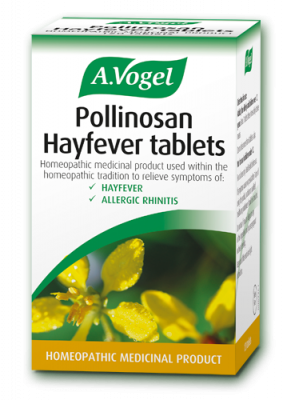
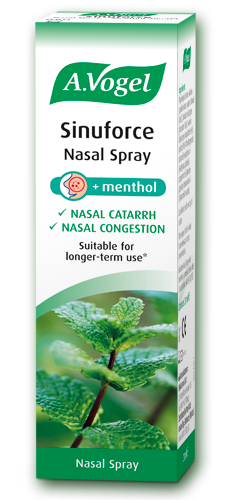
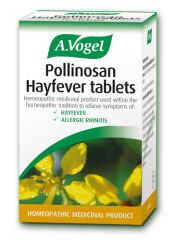 Looking for a solution to curb those hayfever symptoms such as itchy eyes, constant sneezing and congestion, then look no further than A.Vogel’s Pollinosan Hayfever tablets.
Looking for a solution to curb those hayfever symptoms such as itchy eyes, constant sneezing and congestion, then look no further than A.Vogel’s Pollinosan Hayfever tablets.
